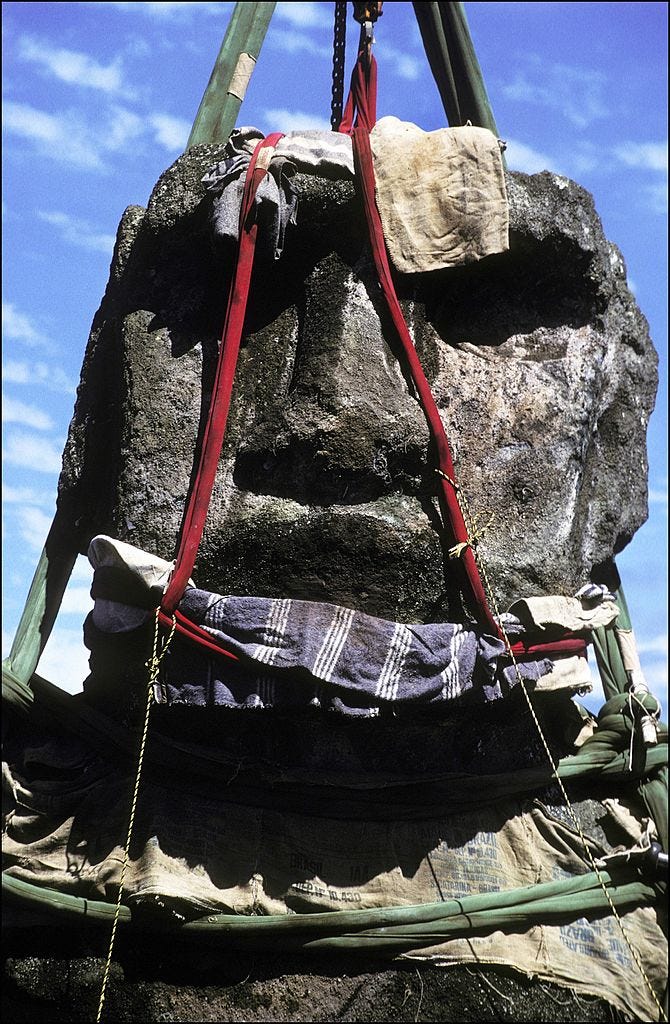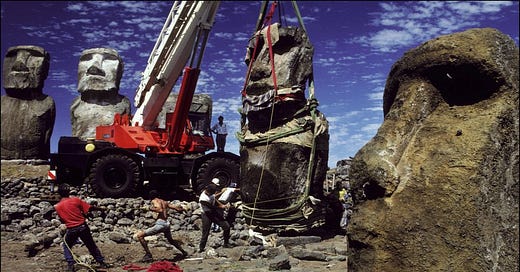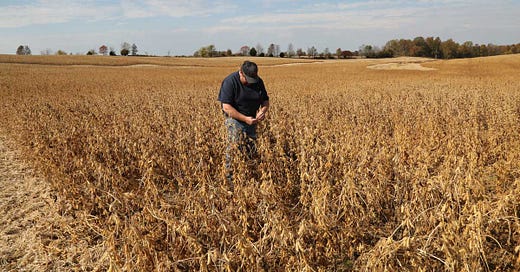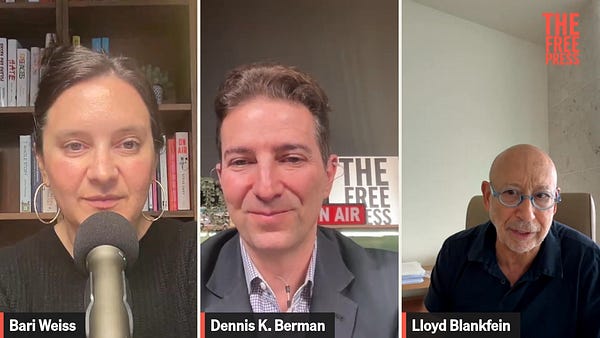
The Free Press

A version of this story originally appeared in Faster, Please!
Easter Island, also known as Rapa Nui, is located in the southeastern Pacific Ocean, some 1,400 miles west of Chile. Polynesians settled there around 900 AD. They developed a complex society, building the now-famous massive stone statues. Back then, the island was covered in subtropical forest, including the world’s largest palm species. Europeans arrived in 1722, by which point the island was completely deforested.
Maybe you’ve heard this story before: a cautionary environmental tale for the modern world.
Here’s how it supposedly goes: Between 900 AD and 1722, islanders had cut trees for firewood, agriculture, canoes, houses, and statue transport. Deforestation then led to soil erosion, crop failures, loss of birds, and eventually the inability to build ocean-going canoes. As resources dwindled, the population, which was once 15,000 strong, crashed. Their society collapsed into warfare, starvation, and cannibalism. The old religion was abandoned, and rival clans toppled each other’s statues.
Jared Diamond—the scientist and historian who dedicated a chapter to telling this catastrophic tale of Easter Island in his well-reviewed 2005 book Collapse: How Societies Choose to Fail or Succeed—lists “human environmental impacts, especially deforestation and destruction of bird populations; and the political, social, and religious factors behind the impacts” as the main factors behind Easter Island’s collapse. The saga is meant to serve as a stark warning to readers about the consequences of unsustainable resource exploitation.
“The parallels between Easter Island and the whole modern world are chillingly obvious,” Diamond writes. “Thanks to globalization, international trade, jet planes, and the Internet, all countries on Earth today share resources and affect each other, just as did Easter’s dozen clans.
Except, it didn’t happen.
A new study published in Nature refutes Diamond’s theory of Rapa Nui collapse. Researchers analyzed genomes from fifteen individuals who lived between 1670 and 1950, using remains from France’s National Museum of Natural History. The genetic data revealed no evidence of a strong population collapse before European contact. Instead, there was steady population growth from settlement until the nineteenth century.
As one of the researchers put it, “There’s no strong collapse. We’re quite confident that it did not happen.” Kathrin Nägele, an archaeogeneticist at the Max Planck Institute for Evolutionary Anthropology, told Nature that the analysis “serves as the final nail in the coffin of this collapse narrative.”
In other words, there was no ecocide. There was no dramatic crash from 15,000 to 3,000 people, nor did the indigenous inhabitants destroy their ecosystem. Instead, the Polynesians that settled Rapa Nui saw their population grow steadily until the nineteenth century. Europeans found 1,500–3,000 people in 1722. Later, disease and slavery reduced the population to 110. Deforestation occurred, but it didn’t cause precontact collapse.
Why do I bring up the debunking of the Easter Island ecocide? It’s not to dismiss Diamond’s entire scholarship, or suggest industrial civilization doesn’t come at an environmental cost worth taking seriously. I bring it up because the Easter Island ecocide myth has been embraced as an essential parable by degrowth advocates—people who think Earth is already beyond its “carrying capacity,” or the maximum population size that the planet can sustainably support given its available resources.

Degrowthers, most of whom are on the far left of the political spectrum, argue that there must be many fewer humans in the future and that they must live less well, at least compared to those of us in rich countries. Old-school environmentalists right through to Greta Thunberg warn about the “limits to growth” and its consequences, including famine from overpopulation and the shortage of key natural resources.
To avoid civilizational collapse, rapacious capitalism must be replaced by a new socioeconomic system based on equilibrium and harmony between humanity and nature. Degrowthers are less interested in transitioning to carbon-free energy as they are focused on consuming less energy—whatever the source. Every time you hear about a green group trying to block a new solar field, or opposing federal reform, that’s degrowth in action, trying to push inaction.
The good news here is that leftist degrowthers are in retreat. The Covid-19 pandemic not only showed the benefits of tech progress through rapid vaccine development but illustrated just how little tolerance humanity has for scarcity. No one likes empty shelves in supermarkets, even if it’s just snacks. More importantly, the global renaissance in nuclear power means reversal of the greatest degrowth victory: making a safe source of clean energy seem wildly dangerous.
Across the world, countries are restarting plants, keeping existing ones open, and building new ones. Constellation Energy just announced a $1.6 billion investment to reopen a reactor at Pennsylvania’s Three Mile Island nuclear plant, the site of a partial meltdown in 1979 that ended nuclear expansion in the U.S. The new project, aimed at powering new Microsoft data centers, demonstrates the renewed interest in nuclear energy driven by surging electricity demand, particularly from AI.
There’s a right-wing version of degrowth too—even if they don’t necessarily march under the “degrowth” banner—and it’s an animating force in the Trumpist GOP. It sees the disruption inherent in modern global techno-capitalism, like when a community loses a major employer, as far outweighing any upside in, say, a country’s higher median household income over the long run. It criticizes consumerism for eroding traditional communities, undermining cultural and national identity. You get a flavor of this when J.D. Vance argues “a million cheap knockoff toasters aren’t worth the price of a single American manufacturing job.”
At its core, degrowth may be as much psychological as ideological. Fear of the unknown drives anxiety about rapid technological change and amplifies concerns over environmental degradation and social disruption. Nostalgia for simpler times fuels a desire to return to a perceived harmonious past. The desire for control and stability in an unpredictable world leads many to embrace degrowth as a way to impose limits and manage future uncertainties.
But if you’re going to propose a radical solution like degrowth, the science has to be right. In addition to the debunking of the story of Easter Island’s collapse, there’s a new literature review where researchers looked at 561 published studies that use the word degrowth in their title. They counted how many studies just talked about ideas or shared opinions, and how many actually used data or created models. The goal was to obtain a clearer picture of how solid the science behind degrowth really is. The conclusion: Not solid at all. According to the paper, only 17 out of 561 studies used theoretical or empirical modeling. When studies do use data, they often rely on very small sample sizes, e.g., a handful of interviews, or focus on unique cases that may not represent broader populations. The paper concluded, “published research on degrowth is dominated by ideology while lacking scientific quality.”
It’s not so much that the degrowthers have got the science wrong, but rather that what they are promoting isn’t really science at all.
Besides, to argue against growth is to argue against something at our very core. Both America and the world need more economic growth and technological progress to tackle global challenges like too much poverty and too little clean energy. Growth means more of, and better access to, what we need and want: clean water and Diet Coke. Ibuprofen and gene therapies for sickle cell disease.
Humanity’s appetite for novelty seems boundless, and that’s okay. Economic growth creates new demands, perpetuating a cycle of expansion and satisfaction. We need more growth. Until cancer is a distant memory, and we all live in a cleaner and more opportunity-filled world—or at least when we’re not spending a long weekend at a lunar resort.
James Pethokoukis is a policy analyst at the American Enterprise Institute. He writes the Faster, Please! newsletter, and his book is called The Conservative Futurist: How to Create the Sci-Fi World We Were Promised.
For more on politics, energy, and the future of our economy, become a subscriber today:
















The degrowth philosophy underlay a lot of 20th Century science fiction (see Star Trek's "Mark of Gideon" episode, the movie "Soylant Green" and many others). It has also been a driver of the push for birth control and unrestricted abortion. Under current population projections it won't be until late this century or the 22nd Century that people will start to realize that more people is a good thing.
Thoughtful article, though I do not in any way see your point re "right-wing degrowth". Wanting to keep jobs locally versus off shore is not , by my reckoning, even remotely related to suppressing the growth of manufacturing or for that matter humanity. It is protecting the politicians most precious asset -- the tax base! You posit that sending work off shore results in net wealth increase via lowered prices for goods, neglecting to factor the cost of loss of jobs, and the comcomitant effects of reduction of the economic multiplier. You present a hypothesis as fact that as far as I know is unproven. Respectfully submitted ....